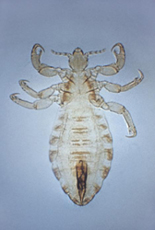Investigations on typhus
 Charles Nicolle decided to study the disease, he also noticed a connection between
Charles Nicolle decided to study the disease, he also noticed a connection between
At first he worked on monkeys, which he inoculated with the blood of patients to produce a fever. Then he cultivated lice on the infected monkeys, and spread them to other monkeys, showing that lice were responsible for transmission. A major break-though came when, three years into his experiments, he found that guinea-pigs could contract typhus. This meant that he could keep the virus alive indefinitely in guinea-pigs and was no longer reliant on the seasonal epidemic as a source of the disease.
He discovered that in some guinea-pigs typhus was so mild they did not even develop a fever, but their blood could transmit the full disease to another animal. He called this inapparent infection, a concept which offered explanation for disease epidemic patterns.
Last edited: 27 August 2014 06:05
